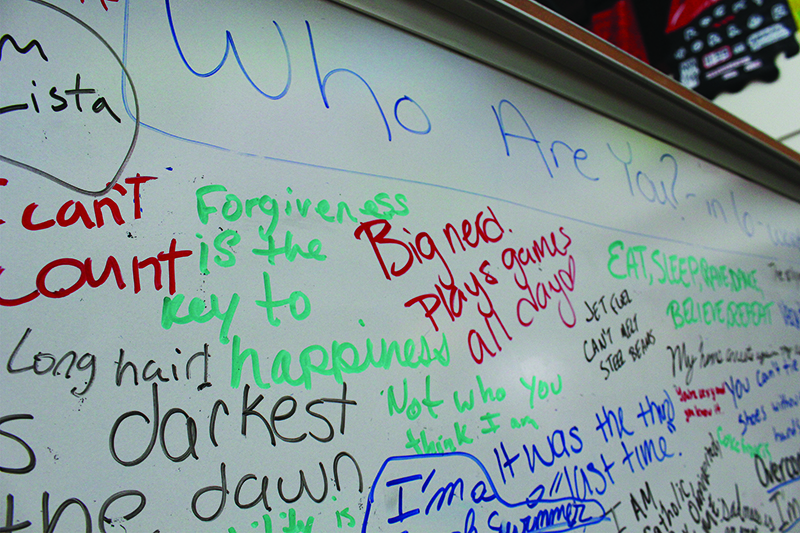In college, the journey of finding out who you are and creating your own story is just beginning. The relationships built with peers and the staff and faculty members, have an influential role in that adventure. And, like every excursion, there can be some bumps in the road. To create a venue to express these unfolding experiences, Dr. Richard Newtown, Elizabethtown College assistant professor of Religious Studies, set up dry erase boards throughout campus as venues for students’ personal stories.
But, they were allowed just six words.
The idea of collecting six-word stories came from Newton’s observation of public issues on campus and the need for awareness in social differences. Formed as an adaption from NPR journalist Michele Norris’s Race Card Project, which won a Peabody Award, students were given a venue to anonymously express who they were, who they weren’t and their ideas of the future. And, with these soundboards spread across campus, Newton found a way to get, “students, faculty and staff talking to each other about social differences in a productive way.”
Too often, the whole of who we are is abbreviated by a handful of words. When we like what is said, it’s a superlative; when we don’t, it’s a stereotype.”
With diversity on campus, and in the world, social issues naturally come into play. And, as Newton explained, Elizabethtown College is not exempt from a history of discrimination. But, he said, “what makes E-town different is our resolve to pursue inclusive excellence at every corner of campus.”
Six-word stories were handed in from E-town athletics teams, classes, residence halls. Newton had marker boards in the student center and library for students to learn about their classmates. Even screens across campus displayed stories to ensure everyone had a role in the conversation.
“Too often, the whole of who we are is abbreviated by a handful of words. When we like what is said, it’s a superlative; when we don’t, it’s a stereotype,” said Newton. “Common to both cases is the fact that we are being defined by someone else. A six-word story is a way for each of us to author our own stories.”
After gathering more than 400 six-word stories through paper submissions, not counting stories written on whiteboards, Newton has created a display. The Six-Word Story Listening Fair is at 10 a.m. Wednesday, Dec. 9, in the Atrium of the College’s Master Center of Science, Mathematics, Engineering and in Room 187 of Esbenshade Hall. Light refreshments will be provided.
With plans to display posters and slide shows, as well as research on identity politics, the event allows attendees to engage with students and their own research. “Using their analytical skills, my Religion 101 students have been investigating how identity politics play out at Elizabethtown College,” explained Newton. “The Six-Word Story Listening Fair is a chance for the campus to come hear what my students have learned.”
The goal behind the creation of the six-word story was to aid students and the community to find answers to questions many are afraid to ask. Expressing an individual story is one thing. Accepting it is another. As Newton asks, “Are we willing to have the hard conversations where we call out the injustice that happens right before our eyes?
“The mission of the college depends on it.”
Martin Luther King Jr., Newton reminded us, is known for saying, “I have a dream.” And with those few words, he challenged the nation to think of the future; asking, “Where do we go from here?”
“That’s the question before us at Elizabethtown College,” Newton said. “We need to write the next six-words of our story together. That means ensuring that every curricular, cocurricular, cultural and administrative entity commits to the task of inclusivity—no exceptions.”


